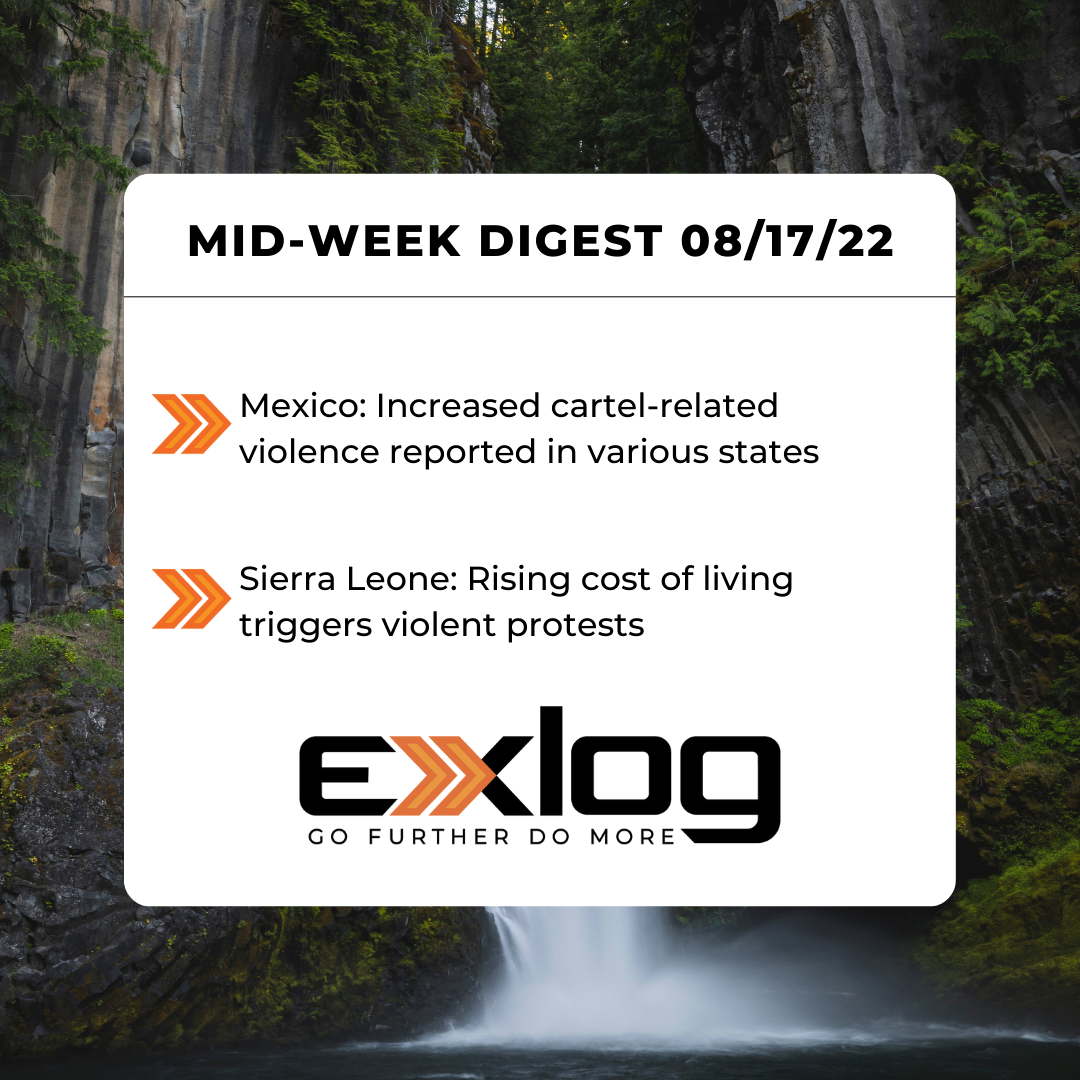Increased cartel violence in mexico and anti-government protests in Sierra Leone
Mexico: Increased Cartel-Related Violence Reported in Various States
An uptick in cartel violence in several northern and central-western states between Aug. 9-13 resulted in substantial property damage, significant disruptions to travel and business operations, and prompted two security warnings from the US government. On Aug. 9, the arrest of a regional drug trafficking manager of the Jalisco New Generation Cartel (CJNG) – one of the largest drug trafficking organizations (DTOs) in the country – fueled a violent retaliation by the group in Jalisco and neighboring Guanajuato state. Alleged CJNG members clashed with security forces, set up roadblocks, and burned at least 28 convenience stores and 24 vehicles in the municipalities of Celaya, Irapuato, Salamanca, Silao, and Apaseo el Grande (Guanajuato), as well as in Zapopan and Ixtlahuacán del Río (Jalisco). No casualties among civilians or the Mexican military were reported, although one suspect was killed in clashes with security forces while eight others were arrested. In response to the violence, the US Consulate in Guadalajara – the capital of Jalisco state – issued a “shelter-in-place” advisory for US government employees. On Aug. 11, a dispute between rival criminal gangs at a prison spilled onto the streets of Ciudad Juarez; armed criminals shot and killed at least nine civilians, threw Molotov cocktails at a commercial establishment, and set fire to convenience stores and private and public vehicles. Mexican Airline Viva Aerobus suspended flights to and from Ciudad Juarez on Aug. 12 citing security concerns. On the same day, criminal groups burned at least 25 vehicles and erected road blockades in Tijuana, Mexicali, Rosarito, Tecate, and Ensenada, prompting the US Consulate in Tijuana to issue another security alert instructing US government personnel to shelter in place. In response, the government deployed 300 troops and 50 members of the National Guard to Tijuana on Aug. 13 to reinforce security measures in the city. Brief episodes of violence – often accompanied by shooting and arson attacks against private and public property – are a common tactic used by Mexican cartels to retaliate against government counternarcotics efforts or to demonstrate force and intimidate civilians and security forces. Last week’s events demonstrate the unpredictability of organized crime dynamics in Mexico and illustrate the heightened threat facing civilians. Although the US government lifted its advisories in both Guadalajara and Tijuana on Aug. 10 and Aug. 14, respectively, the security environment in the states of Jalisco and Baja California, as well as Guanajuato and Chihuahua, is likely to remain volatile in the near term.
Sierra Leone: Rising Cost of Living Triggers Violent Protests
Anti-government protests over a worsening economic crisis turned violent in Sierra Leone on Aug. 10, resulting in police and civilian casualties and disrupting travel and business operations in Freetown, the country’s capital. Following several peaceful demonstrations over the high cost of living staged by female street vendors last month, hundreds of political activists joined the protests on Aug. 10, clashing with security forces and demanding the resignation of President Julius Maada Bio. Protesters threw rocks and assaulted police officers, prompting security forces to retaliate with tear gas and live ammunition. Police data indicate that 21 protesters and six officers were killed during the rallies, while 113 others were arrested. Demonstrators also burned several police stations and erected roadblocks using burning tires in several areas throughout the capital. In an attempt to quell the unrest, the government suspended internet services on Aug. 10 and declared a 1900-0700 curfew through Aug. 13. While Freetown experienced the most disruption, protests also occurred in opposition strongholds in the northern and western regions – including the towns of Kamakwie and Makeni. Unrest of this magnitude is unusual for Sierra Leone, which has remained relatively stable since the end of the civil war in 2002. Nonetheless, the COVID-19 pandemic and global supply shortages exacerbated by the Russia-Ukraine conflict have hampered the country’s economic recovery – rice prices have nearly doubled in recent months, and inflation reached 28% in June. Sierra Leoneans blame the president for failing to adequately respond to the rising cost of living, but the government has dismissed the public’s concerns and accused the opposition of instigating the unrest and attempting to overthrow the government. Commercial establishments in Freetown’s central business district have resumed operations as no protests have been reported since Friday. However, unrest could reignite in the short-to-medium term in the absence of a comprehensive government solution to the worsening economic situation in the country.


